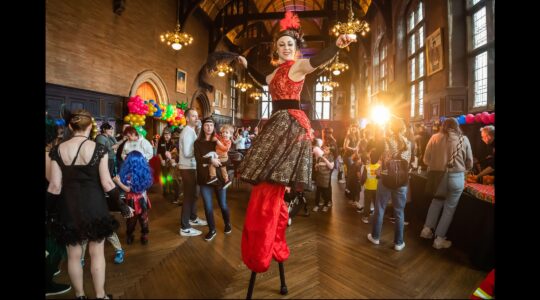It’s not easy to find a way to demonize Holocaust survivors. But Tablet’s Anna Breslaw, in a flailing attempt to find a Jewish take on the new season of "Breaking Bad," came up with this doozie: They must have survived by doing something bad. She writes:
Each time we clapped for the old Hungarian lady who spoke about Dachau, each time Elie Wiesel threw another anonymous anecdote of betrayal onto a page, I eyed it askance, thinking What did you do that you’re not talking about? I had the gut instinct that these were villains masquerading as victims who, solely by virtue of surviving (very likely by any means necessary), felt that they had earned the right to be heroes, their basic, animal self-interest dressed up with glorified phrases like “triumph of the human spirit.”
What, exactly, this has to do with Bryan Cranston’s character on the AMC show, Walter White, is not clear, and Breslaw’s attempt to link her repugnant thesis to Cranston’s character doesn’t really work. She writes:
The rituals, routines, and various institutional, dehumanizing elements of chemo left their mark, their mundanity the primary reason why Walt “breaks bad” with the level of intent displayed in later seasons of the show.
Evil, as Jean Améry says, overlays and exceeds banality. There is no “banality” of evil. In At the Mind’s Limits, Améry—a Holocaust survivor—discusses “concentration camp syndrome”: “The character traits that make out our personality are distorted. Nervous restlessness, hostile withdrawal into one’s own self. … It is said that we are ‘warped.’ ”
It didn’t take long for readers and commentators to respond. John Podhoretz at Commentary declared, "Tablet disgraces itself anew." He wrote:
…the most disgusting piece of anti-Semitism I think I’ve ever read outside of the arrant lunacy of schizophrenic letter writers, and the fact that it was written by a Jew trumpeting her connection to the Holocaust only makes it all the more repugnant."
The Atlantic’s Jeffrey Goldberg wrote: "Breslaw clearly needs help. Tablet needs to ask itself why it would publish such a horror."
On Wednesday, Tablet editor Alana Newhouse published her response to the controversy. She wrote:
the conversation stretched beyond this one article, and raised a number of vital questions for Tablet as a journalistic enterprise: What—if any—is the communal responsibility to the children and grandchildren of Holocaust survivors? Do we have a duty to hear them out, even when their thoughts are—as Breslaw described her own—“unappealing and didactic,” or worse? And what of other writers looking to explore other painful questions about their Jewish identities? What does the intense response to this piece say about what the rules here should be, about what precisely the red lines are in Jewish communal discourse?
What we all did agree on is that it is our duty to more vigilantly and responsibly engage with all of these questions, and with our readers’ legitimate concerns.
UPDATE: Apparently, Breslaw has some sort of Holocaust fetish. In 2010, she dressed up as Anne Frank for Halloween, complete with yellow star (hat tip: Harry Rubenstein). Now, I’m not sure how bad that is (or historically accurate, given that Anne wouldn’t have worn that star while hiding in the attic), but of this I’m certain: Her column is definitely worse.
JTA has documented Jewish history in real-time for over a century. Keep our journalism strong by joining us in supporting independent, award-winning reporting.





